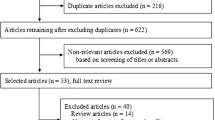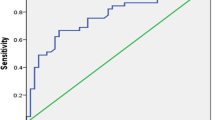Abstract
Several studies investigated the prognostic role of copeptin in stroke. The aim of this study is to assess copeptin levels in serum, and investigate their associations with risk of recurrent stroke in a 1-year follow-up study in patients with ischemic stroke. In this post hoc analysis, serum levels of copeptin and NIH stroke scale (NIHSS) were measured at the time of admission in a cohort of 316 patients with ischemic stroke. The end point was stroke recurrence after 1-year follow-up. We used logistic regression model to assess the relationship between copeptin levels and risk recurrent stroke. Logistic regression analysis considering traditional risk factors showed a relationship between serum copeptin levels and moderate-to-high clinical severity when serum copeptin was used as a continuous variable (OR, 1.05; 95% CI, 1.03–1.09). In the follow-up, 54 patients (17.1%) had a stroke recurrence. The stroke recurrence events distribution across the copeptin quartiles ranged between 5.1% (first quartile) to 23.1% (fourth quartile). In multivariate models comparing the third (OR = 2.78; 95% CI 1.85–3.53) and fourth quartiles (OR = 4.00; 95% CI 2.86–6.50) against the first quartile of the copeptin, levels of copeptin were associated with stroke recurrence events. A higher serum copeptin level is a predictor of both severity at admission and stroke recurrence at 1-year in stroke patients.


Similar content being viewed by others
References
Adams HP Jr, Bendixen BH, Kappelle LJ, Biller J, Love BB, Gordon DL (1993) Classification of subtype of acute ischemic stroke. Definitions for use in a multicenter clinical trial. TOAST. Trial of Org 10172 in Acute Stroke Treatment. Stroke 24:35–41
Armstead WM (2001) Vasopressin-induced protein kinase C-dependent superoxide generation contributes to Atp-sensitive potassium channel but not calcium-sensitive potassium channel function impairment after brain injury. Stroke 32:1408–1414
Bamford J, Sandercock P, Dennis M, Burn J, Warlow C (1991) Classification and natural history of clinically identifiable subtypes of cerebral infarction. Lancet 337:1521–1526
Bjornstad P, Maahs DM, Jensen T, Lanaspa MA, Johnson RJ, Rewers M, Snell-Bergeon JK (2016) Elevated copeptin is associated with atherosclerosis and diabetic kidney disease in adults with type 1 diabetes. J Diabetes Complicat 30:1093–1096
Brott T, Adams HP Jr, Olinger CP, Marler JR, Barsanl WG, Biller J (1989) Measurements of acute cerebral infarction: a clinical examination scale. Stroke 20:864–870
Daubail B, Jacquin A, Guilland JC, Hervieu M, Osseby GV, Rouaud O, Giroud M, Béjot Y (2013) Serum 25-hydroxyvitamin D predicts severity and prognosis in stroke patients. Eur J Neurol 20:57–61
De Marchis GM, Katan M, Weck A, Fluri F, Foerch C, Findling O, Schuetz P, Buhl D, El-Koussy M, Gensicke H, Seiler M, Morgenthaler N, Mattle HP, Mueller B, Christ-Crain M, Arnold M (2013) Copeptin adds prognostic information after ischemic stroke results from the CoRisk study. Neurology 80:1278–1286
De Marchis GM, Weck A, Audebert H, Benik S, Foerch C, Buhl D, Schuetz P, Jung S, Seiler M, Morgenthaler NG, Mattle HP, Mueller B, Christ-Crain M, Arnold M, Katan M (2014) Copeptin for the prediction of recurrent cerebrovascular events after transient ischemic attack. Stroke 45:2918–2923
Dong X, Tao DB, Wang YX, Cao H, Xu YS, Wang QY (2013) Plasma copeptin levels in Chinese patients with acute ischemic stroke: a preliminary study. Neurol Sci 34:1591–1595
Engelbertz C, Brand E, Fobker M, Fischer D, Pavenstädt H, Reinecke H (2016) Elevated copeptin is a prognostic factor for mortality even in patients with renal dysfunction. Int J Cardiol 221:327–332
Fenske W, Wanner C, Allolio B, Drechsler C, Blouin K, Lilienthal J, Krane V, German Diabetes, Dialysis Study Investigators (2011) Copeptin levels associate with cardiovascular events in patients with ESRD and type 2 diabetes mellitus. J Am Soc Nephrol 22:782–790
Greisenegger S, Segal HC, Burgess AI, Poole DL, Mehta Z, Rothwell PM (2015) Copeptin and long-term risk of recurrent vascular events after transient ischemic attack and ischemic stroke. Stroke 46:3117–3123
Hatano S (1976) Experience from a multicentre stroke register: a preliminary report. Bull World Health Organ 54:541–553
Jiao L, Chu C, Zhou S (2015) Prognostic value of copeptin in patients with acute stroke. Expert Rev Neurother 15:563–570
Katan M, Christ-Crain M (2010) The stress hormone copeptin: a new prognostic biomarker in acute illness. Swiss Med Wkly 140:w13101
Katan M, Morgenthaler NG, Dixit KC, Rutishauser J, Brabant GE, Müller B, Christ-Crain M (2007) Anterior and posterior pituitary function testing with simultaneous insulin tolerance test and a novel copeptin assay. J Clin Endocrinol Metab 92:2640–2643
Katan M, Morgenthaler N, Widmer I, Puder JJ, König C, Müller B, Christ-Crain M (2008) Copeptin, a stable peptide derived from the vasopressin precursor, correlates with the individual stress level. Neuroendocrinol Lett 29:341–346
Kozniewska E, Gadamski R, Klapczynska K, Wojda R, Rafalowska J (2008a) Morphological changes in the brain during experimental hyponatremia. Do vasopressin and gender matter? Folia Neuropath 46:165–170
Kozniewska E, Romaniuk K (2008b) Vasopressin in vascular regulation and water homeostasis in the brain. J Physiol Pharmacol 59(Suppl 8):109–116
Lewandowski KC, Lewiński A, Skowrońska-Jóźwiak E, Stasiak M, Horzelski W, Brabant G (2016) Copeptin under glucagon stimulation. Endocrine 52:344–351
Marston NA, Maisel AS (2014) The prognostic value of copeptin in patients with acute chest pain. Expert Rev Cardiovasc Ther 12:1237–1242
Potocki M, Breidthardt T, Mueller A, Reichlin T, Socrates T, Arenja N, Reiter M, Morgenthaler NG, Bergmann A, Noveanu M, Buser PT, Mueller C (2010) Copeptin and risk stratification in patients with acute dyspnea. Crit Care 14:R213
Sims JR, Gharai LR, Schaefer PW, Vangel M, Rosenthal ES (2009) ABC/2 for rapid clinical estimate of infarct, perfusion, and mismatch volumes. Neurology 72:2104–2110
Tasevska I, Enhörning S, Persson M, Nilsson PM, Melander O (2016) Copeptin predicts coronary artery disease cardiovascular and total mortality. Heart 102:127–132
Tu WJ, Dong X, Zhao SJ, Yang DG, Chen H (2013) Prognostic value of plasma neuroendocrine biomarkers in patients with acute ischaemic stroke. J Neuroendocrinol 25:771–778
Tu WJ, Ma GZ, Ni Y, Hu XS, Luo DZ, Zeng XW, Liu Q, Xu T, Yu L, Wu B (2017) Copeptin and NT-proBNP for prediction of all-cause and cardiovascular death in ischemic stroke. Neurology. doi:10.1212/WNL. 0000000000003937
Vakili A, Kataoka H, Plesnila N (2005) Role of arginine vasopressin V1 and V2 receptors for brain damage after transient focal cerebral ischemia. J Cereb Blood Flow Metab 25:1012–1019
Volpi S, Rabadan-Diehl C, Aguilera G (2004) Vasopressinergic regulation of the hypothalamic pituitary adrenal axis and stress adaptation. Stress 7:75–83
Wang CB, Zong M, Lu SQ, Tian Z (2016) Plasma copeptin and functional outcome in patients with ischemic stroke and type 2 diabetes. J Diabetes Complicat 30:1532–1536
Wannamethee SG, Welsh P, Lennon L, Papacosta O, Whincup PH, Sattar N (2016) Copeptin and the risk of incident stroke, CHD and cardiovascular mortality in older men with and without diabetes: the British Regional Heart Study. Diabetologia 59:1904–1912
Xu Q, Tian Y, Peng H, Li H (2016) Copeptin as a biomarker for prediction of prognosis of acute ischemic stroke and transient ischemic attack: a meta-analysis. Hypertens Res. doi:10.1038/hr.2016.165
Zeng X, Deng A, Ding Y, Ni Y, Xu T, Liu J, Yang B, Gao M, Ma G, Ding W, Mu L (2016) Copeptin and NT-proBNP as prognostic markers for recurrent ischemic cerebrovascular events in ischemic stroke patients. J Am Coll Cardiol 68:2710–2711
Zhang JL, Yin CH, Zhang Y, Zhao LB, Fu HJ, Feng JC (2013) Plasma copeptin and long-term outcomes in acute ischemic stroke. Acta Neurol Scand 128:372–380
Zhang R, Liu J, Zhang Y, Liu Q, Li T, Cheng L (2017a) Association between circulating copeptin level and mortality risk in patients with intracerebral hemorrhage: a systemic review and meta-analysis. Mol Neurobiol 54:169–174
Zhang P, Wu X, Li G, Sun H, Shi J (2017b) Prognostic role of copeptin with all-cause mortality after heart failure: a systematic review and meta-analysis. Ther Clin Risk Manag 13:49
Zhang Q, Ding H, Yan J, Wang W, Ma A, Zhu Z, Cianflone K, Hu FB, Hui R, Wang DW (2011) Plasma tissue kallikrein level is negatively associated with incident and recurrent stroke: a multicenter case–control study in China. Ann Neurol 70:265–273
Acknowledgements
This study was supported by National Natural Science Foundation of China (81400330). We express our gratitude to all the patients who participated in this study, and thereby made this work possible.
Author information
Authors and Affiliations
Contributions
Ji had full access to all of the data in the study and takes responsibility for the integrity of the data and the accuracy of the data analysis.
Study concept and design: Tang, Wang, Li, Dong, and Ji.
Acquisition of data: Tang, Wang, and Ji.
Analysis and interpretation of data: Tang, Li, and Dong.
Drafting of the manuscript: Tang and Ji.
Critical revision of the manuscript for important intellectual content: Wang, Li, and Dong.
Administrative, technical, or material support: Tang, Wang, and Li.
Study supervision: Li.
Corresponding author
Ethics declarations
Conflict of Interest
The authors declare that they have no conflict of interest.
Ethics Statement
The present study has been approved by the ethics committee of the Qilu Hospital of Shandong University. All participants or their relatives were informed of the study protocol, and their written informed consents were obtained.
Rights and permissions
About this article
Cite this article
Tang, WZ., Wang, XB., Li, HT. et al. Serum Copeptin Predicts Severity and Recurrent Stroke in Ischemic Stroke Patients. Neurotox Res 32, 420–425 (2017). https://doi.org/10.1007/s12640-017-9754-5
Received:
Revised:
Accepted:
Published:
Issue Date:
DOI: https://doi.org/10.1007/s12640-017-9754-5




